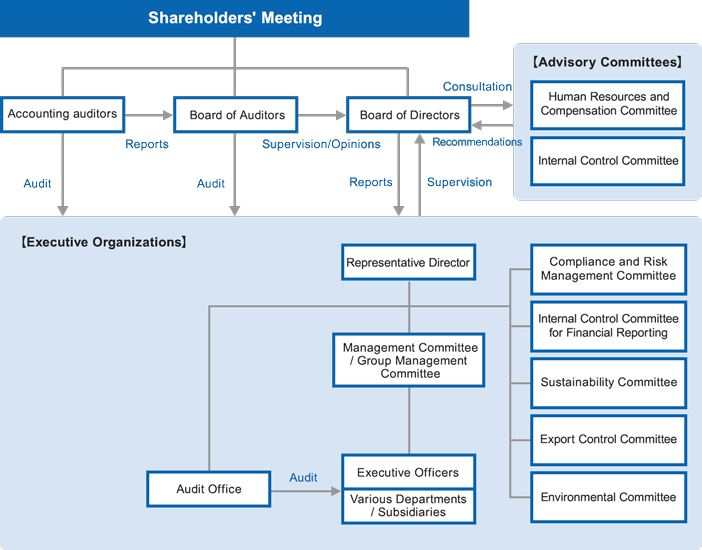Environmental Basic Philosophy
Our group recognizes that the fundamental principle of corporate management is based on the corporate philosophy. In addition to complying with laws, regulations, and other societal norms as a corporate citizen, we believe it is crucial to increase corporate value through sound and transparent management practices for stakeholders, including customers, business partners, shareholders, and employees. This is an important and ongoing management challenge that we must continue to pursue both now and in the future. Under this recognition, overcoming these challenges is the responsibility of the company and will ultimately lead to the company’s sustainable development. We understand corporate governance as the system that materializes this fundamental approach to corporate management.
Governance Materiality, Objectives, and KPIs
| Materiality | Materiality details | Goals | KPI |
|---|---|---|---|
| Build a sound management foundation | Adhere to "Fundamentals and Integrity" | Comply with the TOYO INNOVEX Group's Code of Conduct | Number of serious legal violations, number of company regulation violations |
| Strengthen compliance and risk management | Compliance workplace discussion participation rate, Harassment prevention training participation rate, Understanding of power harassment prevention | ||
| Promote the enhancement of the management system | Ensure diversity | Ratio of independent outside directors among board members (maintaining over one-third), Percentage of female managers, Percentage of career hires in management positions | |
| Enhance disclosure of information | Access count for disclosure materials for individual investors | ||
| Practice engagement with stakeholders | Annual dialogue count with shareholders and institutional investors |
History of Governance Strengthening
In order to gain the trust of all stakeholders, we have worked on developing and building the optimal corporate governance system from the perspective of improving management soundness, transparency, and efficiency.
2003
Introduction of the executive officer system
2006
Introduction of the internal whistleblowing system
2007
Establishment of the Compliance Committee
2015
Appointment of an outside director
Establishment of the Human Resources and Compensation Committee
2016
Initiation of the Board of Directors' effectiveness evaluation
Establishment of the Compliance and Risk Management Committee
2017
Appointment of a second outside director
2018
Introduction of stock-based compensation with transfer restrictions
2019
Establishment of the Internal Control Committee
2020
Increase the ratio of outside directors to one-third
2021
Introduction of two types of stock-based compensation with transfer restrictions
2022
Establishment of the Sustainability Committee
2023
Formulation of a Business Continuity Plan (BCP)
Appointment of a female director
Corporate Governance Structure
Regarding important corporate governance topics, the company aims to establish a disciplined management system by setting up specialized organizations for each area.

Roles and Authority of Each Organization:
| Organization | Role and Authority |
|---|---|
| Board of Directors | Supervise significant management decisions and the execution of directors' duties. |
| Board of Auditors | Audit the execution of directors' duties, Investigate the status of operations and assets, Decide on the audit policy and the execution of duties by auditors, and Prepare audit reports. |
| Establishment of the Human Resources and Compensation Committee | Receive consultations from the Board of Directors and deliberate on and make recommendations regarding the personnel and compensation of directors, auditors, and executive officers. |
| Establishment of the Internal Control Committee | Deliberate and make recommendations on matters related to compliance with laws and regulations, risk management, and ensuring proper business operations. |
| Management Committee / Group Management Committee | Deliberate on important matters affecting the overall management of the company, especially those that impact critical decisions. |
| Internal Control Committee for Financial Reporting | Decide on operational policies for internal controls related to financial reporting (such as determining the scope of evaluation, appointing auditors, etc.) and evaluate their effectiveness. |
| Establishment of the Compliance and Risk Management Committee | Deliberate on matters related to compliance with laws and corporate ethics, education, and the avoidance and reduction of risks that are anticipated to arise in business operations. |
| Establishment of the Sustainability Committee | Deliberate on matters related to sustainability and key corporate issues. |
| Export Control Committee | Plan and promote the management of important matters concerning transactions involving regulated goods and similar areas. |
| Environmental Committee | ISO 14001 Management System Operations, Internal Audits, and Certification Body Response |